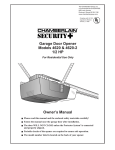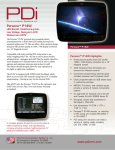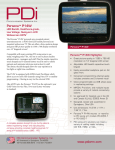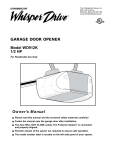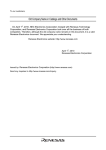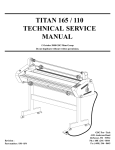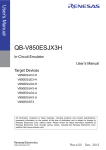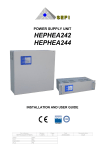Download Chamberlain TCR2 User's Manual
Transcript
TRICODE® TCR2 DUAL CHANNEL RECEIVER ® USED FOR TCR1 AND TCR2 WARNING WARNING SPECIFICATIONS CAUTION WARNING Output Rating: 5 Amps 28Vac/Vdc Max. Power: 12Vdc or 18 to 34Vac/Vdc, @ 30ma RF Frequency: 300 or 310 MHz Accessory Transmitters: TC1, TC2 and TC4 To prevent possible SERIOUS INJURY or DEATH from electrocution: • Be sure power is NOT connected BEFORE installing the receiver. To prevent possible SERIOUS INJURY or DEATH from a moving gate or garage door: The TriCode® digital receivers are designed for use with automatic garage/gate operators and access control systems. All TriCode® products may be matched with Linear/Delta-3TM, Multi-CodeTM, and StanleyTM radio products which may already be installed. The TriCode® radio format provides a potential of 1024 different digital codes. For Linear/Delta-3TM compatible products, 256 different digital codes are available. The codes are set using 10-position DIP switch system. • ALWAYS keep transmitters out of reach of children. NEVER permit children to operate or play with remote control transmitters. • Activate gate or door ONLY when it can be seen clearly, is properly adjusted, and there are no obstructions to door travel. • ALWAYS keep gate or garage door in sight until completely closed. NEVER permit anyone to cross path of moving gate or door. NOTICE: To comply with FCC and or Industry Canada (IC) rules, adjustment or modifications of this receiver and/or transmitter are prohibited, except for changing the code setting or replacing the battery. THERE ARE NO OTHER USER SERVICEABLE PARTS. Tested to Comply with FCC Standards FOR HOME OR OFFICE USE. Operation is subject to the following two conditions: (1) this device may not cause harmful interference, and (2) this device must accept any interference received, including interference that may cause undesired operation. U.S. Patent 6,915,146 POWER SWITCH SETTINGS NOTE: To avoid the possibility of duplicating codes in adjacent systems, all transmitters and receivers should be re-coded prior to operation. Unless using maximum number of codes the following four codes should not be used: · All DIP Switches ON · All DIP Switches OFF · DIP Switches alternating ON/OFF · DIP Switches alternating OFF/ON Power Supply Selection Setting The TriCode® receiver is factory set for 24 volt power input if 12 volt is required. Remove back cover of receiver by removing screws. Set jumper to the 12 volt setting (Figure 1). Receivers should be installed at least 5' apart to avoid cross-talk. After completing installation, operate transmitter outside of building to make certain the chosen DIP switch setting does not operate with nearby garage door operators and/or security systems. If so, select another DIP switch setting and check the coded signal again. Repeat as necessary. RECEIVER MOUNTING Mount receiver to wall using #6 hardware (not provided). Hardware used will depend on mounting application. Refer to Figure 1 for receiver mounting hole locations. Figure 1 Back View JUMPER (P3) Mounting Holes 24V P3 24V 12V P3 2 12V OUTPUT RELAYS & CONFIGURATION SWITCH SETTINGS Setting Output Relay Mode The TriCode® receiver is factory set for momentary relay output “MNT”. Setting the Configuration Switch The TriCode® receiver is factory set for Linear/Delta-3TM. Locate the configuration switch and set it to the desired RF mode of operation (Figures 2 and 3). Modes are as follows: Linear/Delta-3TM: works with all “Linear/Delta-3TM” transmitters transmitted at 310 MHz using 8-bits ID system. MultiTM: works with all “Multi-CodeTM” transmitters transmitted at 300 MHz using 10-bits ID system. StanleyTM: works with all “StanleyTM radio” transmitters transmitted at 310 MHz using 10-bits ID system. • Momentary mode: The output relay will be on for .5 seconds before turning off. • Constant pressure mode: Output relay is continuously on while receiving matching/valid ID code from transmitter. The output relay will turn off immediately once receiver does not receive a matching/valid ID code from the transmitter (Figure 3). NOTE: If constant pressure mode is desired, open front cover and move mode jumper from “MNT” to “CST” (Figure 2). Figure 2 Configuration Switch Delta-3/ Linear Multi-Code Stanley TM Figure 3 Relay CH2-mode Relay CH1-mode CH1 MODE CST MNT CST MNT CH2 MODE LINEAR MULTI STAN CH1 CST MODE MNT CST MNT CH2 MODE 3 Configuration Switch TM TM TM Delta-3/Linear TM Multi-Code Stanley TM TM TM TM 310 MHz 300 MHz 310 MHz DIP SWITCH SETTINGS & POWER CONNECTIONS Setting DIP Switch The TriCode® Receiver DIP switch CH1 is factory set OFF (1-10) and CH2 is factory set ON (1-10). Locate the 10 position DIP switch. If this is a new installation using TriCode® transmitters, randomly set switches matching those of the transmitter. Never use factory settings. If receiver is used with Linear/Delta 3TM, Multi-CodeTM or StanleyTM transmitters, match the receiver DIP switch to the above transmitters. Some transmitters may use toggle switches and it may be difficult to determine on & off. If so, try reversing the setting on the TriCode® DIP switch (Figures 4 and 5). Power Supply and Relay out Connections There are six wires exiting the housing (Figure 6): RED & BLACK - POWER INPUT BROWN & BLUE - CHANNEL 1 RELAY OUTPUT WHITE & GREEN - CHANNEL 2 RELAY OUTPUT Power Supply 12V/24V Black NOTE: In 'LINEAR/DELTA-3TM' mode (8-bits system) the last 2 bits (DIP #9 & 10) settings are ignored. They can be left in either ‘ON’ or ‘OFF’ settings. Figure 4 Multi/ Stanley (1 Thru 10) Linear/ Delta-3 (1 Thru 8) DIP Switch O N 1 2 3 4 5 6 Brown Relay Output Ch1 White TM 7 8 Relay Output Ch2 9 10 DIP Switches Channel 2 DIP Switch O 1 2 3 4 5 6 7 8 9 10 N Channel 1 DIP Switch O 1 2 3 4 5 6 7 8 9 10 N Figure 5 2 3 4 5 6 7 8 9 10 O1 N 2 3 4 5 6 7 8 9 10 For installation and service information please call our toll free number: 1-800-528-2806 or contact us through the web at www.chamberlaingroup.com 01-17468D Blue TM O F F O1 N Red Figure 6 © 2007, The Chamberlain Group, Inc. All Rights Reserved Green




